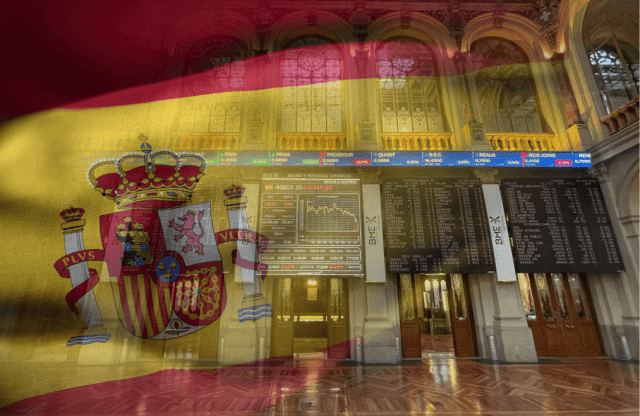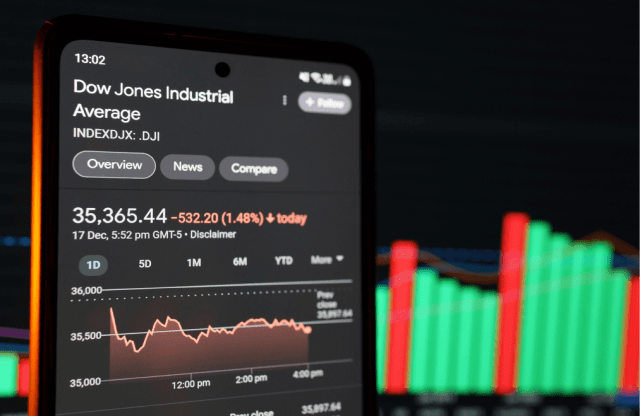A complete guide to the Hang Seng Index

Learn all about the Hong Kong stock index, from its price journey to what impacts its value, and follow the Hang Seng live price via our comprehensive chart.
What is the Hang Seng?
The Hang Seng Index (HSI index), traded as the Hong Kong 50 on Capital.com, is the stock market index for Hong Kong, tracking the performance of the largest and most-liquid companies listed on the Hong Kong Stock Exchange (HKEX). It is often used as a benchmark to gauge the overall health and performance of the Hong Kong stock market. The index includes the biggest companies across various sectors, making it a comprehensive indicator of the economic and financial conditions in Hong Kong.
The HSI is determined using a free-float-adjusted market capitalisation-weighted methodology, where market cap is calculated by the share price multiplied by the number of outstanding shares. The resulting figure is then adjusted to include only publicly available shares, ensuring the index accurately reflects the market dynamics and sentiments influenced by freely tradable stocks.
What is the Hang Seng price history?
The Hang Seng price history begins in 1969 when the index was introduced at a base of 100 points. Since then, it has experienced significant fluctuations, reflecting the broader socioeconomic and political changes both regionally and globally.
In the 1970s, the Hang Seng showed its first major movements, buoyed by Hong Kong's booming economy. However, the 1973 oil crisis and the subsequent global recession brought it sharply down from its peaks.
The 1980s were a period of significant growth, driven by Hong Kong's rapid industrialisation and the emergence of China as an economic powerhouse. The index saw a substantial rise, peaking in 1987 before the global stock market crash in October of that year, known as Black Monday, caused a sharp drop.
1997 was marked by a major Asian financial crisis, during which the HSI moved significantly lower, losing over 60% of its value from its pre-crisis peak.
Moving into this century, the 2000s dot-com bubble impacted the Hang Seng, alongside other major global indices. The HSI reached its all-time high in October 2007, propelled by strong local property markets and extensive international capital flows. However, it soon felt the impact of the global financial crisis in 2007-2008, losing about two thirds of its value over the next year.
Since this key event, the HSI has experienced periods of recovery, marked by rapid growth, alongside moments of volatility due to various factors such as the European debt crisis, changes in US economic policy, and trade tensions between the US and China. However, the 2020 Covid-19 pandemic saw sharp declines for the HSI, sharp declines as the economic implications of the virus became apparent. However, it subsequently recovered some of its losses, reflecting the broader global stock market resilience.
(Past performance is not a reliable indicator of future results)
What factors might affect the performance of the Hang Seng?
The performance of the Hang Seng may be impacted by a range of key fundamental events that are important to research when trading the index. Be sure to check out our market analysis section for regular insights into the key price drivers for your favourite markets. Here are a few of the main factors to consider for the Hang Seng:
-
Economic indicators: the Hang Seng Index is strongly integrated with the economic health of Hong Kong and, by extension, China. Key economic indicators such as GDP growth, unemployment rates, and retail sales can significantly influence investor sentiment. Strong GDP growth typically signals robust economic health, bolstering investor confidence and lifting the index, while an uptick in unemployment could dampen this sentiment. The retail sales figures offer insights into consumer spending, a vital component of Hong Kong's economy, affecting the performance of stocks, particularly in the consumer goods and services sectors.
-
Monetary policy: the Hong Kong Monetary Authority (HKMA) plays a critical role in shaping the economic environment impacting the Hang Seng through its monetary policy. Hong Kong's currency peg to the US dollar dictates that its interest rate movements are closely aligned with those of the US Federal Reserve. Lower interest rates generally decrease the cost of borrowing, stimulate economic activities, and support higher stock prices. Meanwhile, higher rates potentially mean less disposable income for indebted consumers to spend in the economy, as well as higher costs of servicing debt for businesses. These factors in turn can suppress stock and index prices. Additionally, interventions such as adjustments in the reserve requirement for banks can influence liquidity in the economy, thereby impacting the stock market.
-
Geopolitical factors: Hong Kong's position as a global financial hub and its political relationship with China make it susceptible to geopolitical shifts. Changes in trade policies, international disputes, and internal political developments, such as those related to governance and security laws, can significantly sway investor confidence and, consequently, the HSI. The index responds to both regional geopolitical tensions and global events, reflecting the sensitivity of Hong Kong's market to external and internal pressures.
-
Global economic conditions: the HSI is also affected by broader global economic conditions due to Hong Kong's significant trade ties and the international nature of its stock market. Events like the US-China trade war, changes in global commodity prices, and international financial crises can lead to significant volatility. Investors closely monitor global economic indicators and events, which influence market sentiments and, subsequently, the index's performance.
-
Sector performance: the HSI’s movement is particularly sensitive to the performance of its constituent sectors. Financial services, real estate, and information technology are some of the heavily weighted sectors. Performance in these areas can have a disproportionate impact on the index. For example, regulatory changes affecting real estate companies or technological advancements impacting the IT sector can lead to substantial price movements within the index.
What companies are in the Hang Seng?
The Hang Seng features companies such as global insurance and finance corporation AIA Group, as well as Jardine Matheson, a conglomerate that owns brands such as hotel chain Mandarin Oriental and automotive group Astra International. Major real estate developer Sun Hung Kai Properties and tool manufacturer Techtronic Industries also feature on the list. Here’s more on the companies that you’ll find on the Hang Seng.
What are the Hong Kong Stock Exchange opening hours?
The Hang Seng Index operates within the trading hours of the Hong Kong Stock Exchange (HKEX). The trading hours for the morning session are 9:30am to 12:00pm local Hong Kong time, and 1:00pm to 4:00pm for the afternoon session. In the UTC timezone, this equates to opening at 1:30am and closing at 8:00am.
There is also a pre-market opening session from 9:00am to 9:30am local time, where orders can be placed but no trades are executed until the market officially opens.
If you choose to trade CFDs, you can follow the Hang Seng performance live with the comprehensive Hang Seng price chart.
Monitoring the index’s activity can help you to keep an eye out for any key fundamental or technical events that may affect short-term movements in the price.
How to trade the Hang Seng with CFDs
If you want to take a position on the Hang Seng, you have a choice of methods. First, you can trade a derivative product such as a contract for difference (CFD) on the stock market price using leverage. A CFD is a financial contract, typically between a broker and a trader, where one party agrees to pay the other the difference in the value of a security, between the opening and closing of the trade.
Using a CFD, your trading strategy can involve holding a long position (speculating that the Hang Seng price will rise) or a short position (speculating that it will fall). This is considered a short-term investment or trade, as CFDs tend to be used within shorter timeframes.
CFDs are traded on margin, which means that a trader typically has exposure to larger positions with a relatively small outlay. This amplifies the potential profits, but also the potential losses, making leveraged trading risky. You can learn how to trade shares in our comprehensive guide to shares trading, and you can discover more of our helpful trading guides on a range of key trading topics.
Aside from CFDs, you can also trade the Hang Seng through instruments like options, ETFs, and mutual funds. Options allow for speculative investment with controlled risk, ETFs enable straightforward stock-like trading of the index, and mutual funds offer a managed, buy-and-hold approach to tracking its performance. Each offers an alternative to the leveraged trading of CFDs, catering to different risk profiles and investment strategies.
To trade share CFDs with us, just sign up for a Capital.com account, and once you’re verified, you can use our advanced web platform or download our intuitive yet easy-to-use app. It’ll take just a few minutes to get started and access the world’s most-traded markets.
Need more support? Try our step-by-step indices course to guide you through the basics to the advanced concepts.
Why trade index CFDs with Capital.com?
Trading index CFDs with Capital.com means you’ll enjoy an intuitive, easy-to-use platform, 24/7 support, fair and transparent pricing, along with award-winning education to help build your experience in the markets.* You can seamlessly integrate our smart platform with elite third-party software TradingView and MT4, and refine your strategies with our risk-free demo.
*Awarded best-in-class for education at ForexBrokers.com’s 2024 Annual Awards
FAQs
What is the Hang Seng index?
The Hang Seng Index is a stock market index featuring 50 of the largest Hong Kong companies. Compiled by market capitalisation, it is weighted with the most capitalised companies at the top of the index. The Hang Seng live price is available to trade, whether you think the price will rise or fall, via instruments such as CFDs.
How to trade the Hang Seng index
The Hang Seng index can be traded through leveraged derivatives such as CFDs. This means you can speculate on the price of the market either rising or falling, and can control a large position while only having to put down a small percentage of the total value of the trade. This can amplify your profits beyond your original deposit, but also your losses, making leveraged trading risky. Many traders use fundamental analysis to trade indices, keeping an eye on the macroeconomic events that can impact the price of such markets. Others may use technical patterns based on historical data to get a feel for past price action.
What time does the Hang Seng index open?
The trading hours for the Hang Seng morning session are 9:30am to 12:00pm local Hong Kong time, and 1:00pm to 4:00pm for the afternoon session.
Visit our other complete guides

How to trade Spain 35
